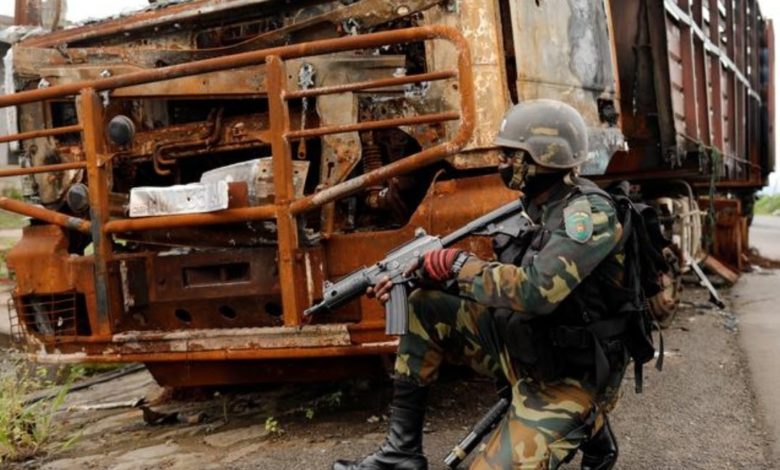Insecurity In Cameroon’s Restive Anglophone regions Denies Over 40,000 People Food
Continued insecurity in Cameroon's Northwest and Southwest regions affects the provision of humanitarian aid to the local population.

Insecurity in Cameroon’s restive anglophone regions of Northwest and Southwest, have negatively impacted humanitarian conditions and denied over 40,000 people food assistance.
This is according to a situation report produced by the United Nations Office for the Coordination of Humanitarian Affairs (OCHA) in collaboration with humanitarian partners and COVID-19 Task Force, published on Oct. 12.
The Anglophone region neighbouring Nigeria has been facing a separatist and guerilla campaign ignited five years ago after angry protests against Francophone dominance in the country escalated into armed clashes between separatist groups and Cameroonian security forces.
The report which covers Aug. 1 and 31 stated that the situation in the Northwest and Southwest regions remains concerning, adding that hostilities, armed clashes, increased
use of improvised explosive devices, in addition to inter-communal clashes between farmers and graziers in Menchum division in the Northwest have compounded the situation.
“The population remains caught in the crossfire and exposed to violence leading to the displacement of thousands of people. For several weeks, roadblocks have been obstructing humanitarian access, preventing the delivery of aid to affected people.”
It was revealed that about 8,500 persons were reported to have been displaced in August while about 530 persons returned to their areas of origin as they could not cope with the poor living conditions in hosting towns.
The report further highlighted the situation with roadblocks and challenges faced by aid actors, stating that “Increasing security incidents and blockages of major roads in the Northwest caused delays, or prevented the delivery of life-saving assistance.”
“This also limited the mobility of aid workers and deprived some vulnerable communities of assistance. 40,000 people did not receive food rations in the two regions where 1.1 million people are severely food insecure in the Cadre Harmonise report, published in March 2021.”
The insecurity has also affected the healthcare sector with four attacks on health facilities reported, including incidents such as the abduction of health personnel for ransom, the removal of patients from ambulances and the seizure of healthcare assets
“Doctors Without Borders (MSF) was forced to downsize it’s teams in the Northwest eight months after the government suspended its activities in the region. This led to poor or no access to healthcare for thousands of people who depended on the free healthcare and ambulance services that MSF provided.”
The occurrence of security incidents was reported to put children at risk of being caught in crossfires, “exacerbating their fears and anxieties, separation from family, abuse and other forms of exploitation. According to the Gender-Based Violence Sub-Cluster (GBV), out of 1,205 GBV cases reported in August, 28 per cent of the survivors are children.”
In June, MSF called on the Cameroon government to prioritise people’s healthcare needs and lift the suspension on MSF, allowing the organisation to resume lifesaving medical activities.
MSF said, “as violence continues in the anglophone North-West and South West regions of Cameroon, people have struggled to access healthcare”. It added that the situation has been exacerbated over the last nearly seven months, as Cameroonian authorities suspended MSF’s services in the Northwest region.
More than 2 million people have been affected by the violence with over 700 thousand people displaced within or outside the Northwest and Southwest region. About 67 thousand Cameroonians are seeking refuge in Nigeria.
Support Our Journalism
There are millions of ordinary people affected by conflict in Africa whose stories are missing in the mainstream media. HumAngle is determined to tell those challenging and under-reported stories, hoping that the people impacted by these conflicts will find the safety and security they deserve.
To ensure that we continue to provide public service coverage, we have a small favour to ask you. We want you to be part of our journalistic endeavour by contributing a token to us.
Your donation will further promote a robust, free, and independent media.
Donate HereStay Closer To The Stories That Matter




